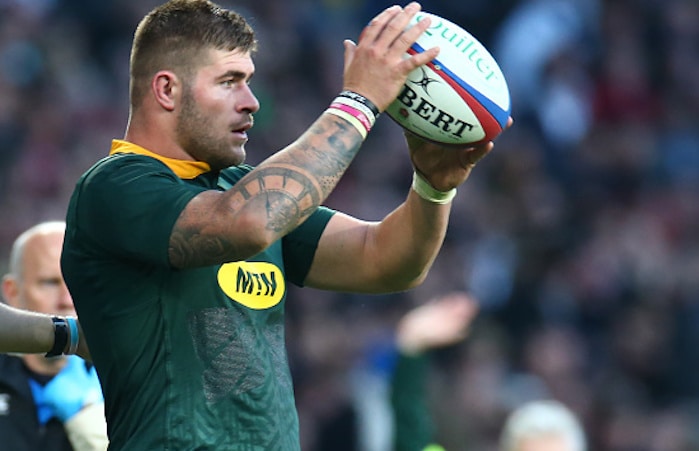The Springboks have more important matters to concern themselves with than the last-minute refereeing blunder on Saturday, writes CRAIG LEWIS.
At Saturday’s post-match press conference, Rassie Erasmus was inevitably asked about Owen Farrell’s controversial late tackle on André Esterhuizen that largely overshadowed the Boks’ one-point defeat.
The Bok coach deserves a rugby Oscar for his response. With a textbook deadpan expression, Erasmus suggested that the tackle had been highly effective and that the Boks should look to master the art of such a hit themselves if it was deemed ‘legal’.
With not even a wry smile, he left it up to the rugby public to read between the lines.
Yet, there is one thing you can be sure of. When the Bok coaches and players conduct their post-match reviews, there will similarly be no whingeing about the oversights of the officials during the latter stages of Saturday’s game.
Instead, the Springboks will look one another in the eye, and acknowledge wholeheartedly that their performance was simply not good enough.
For a team that largely enjoyed ascendancy at scrum time, emphatically won the gainline battle and benefited from plenty of possession and territory, it’s unforgivable that the Springboks managed to muster just 11 points against an under-strength England team.
That’s the reality. But it’s also an important learning curve just a few Tests away from their World Cup opener.
On Saturday, the key letdowns for the Springboks proved to be a malfunctioning lineout, a failure to build scoreboard pressure, and a largely overlooked missed penalty from Handré Pollard.
It all reminded me of a highly insightful recent World Rugby video that featured former Bok captain John Smit, who sat down to watch and comment on the entire 2007 World Cup final won by South Africa – ironically against England.
What resonated through Smit’s commentary was just how well-prepared the Springboks were, and how accurately they executed their basics and a finely tuned game plan. The Springboks boasted such self-belief that Smit admits there were hardly any nerves before kick-off.
Then came the game plan. With a lineout master in Victor Matfield, the Springboks targeted this England set piece and effectively disrupted this key source of first-phase possession. In addition, with the reliable service of Smit and reliable jumpers such as Matfield and Juan Smith, the Springboks were almost assured of retaining their own lineout ball.
With a metronomic goal-kicker in Percy Montgomery, Smit says it was also a game-changer as a captain to be able to hand the ball to the veteran fullback from any part of the field and know with virtual certainty that it would guarantee three points. If the penalty was outside Montgomery’s range, he could hand the ball to ‘rocket launcher’ Frans Steyn.
Now, if we turn to the current Bok team that is still undergoing a rebuilding phase of sorts, it’s worth wondering whether they could head into a World Cup final with such self-belief in these key fundamentals for success in high-pressure playoff rugby.
For all his attributes as a world-class hooker, Malcolm Marx would be the first to admit that his lineout throwing remains an area of his game that requires considerable fine-tuning. It’s no different for Bongi Mbonambi.
One can’t forget that part of the reason for Smit being picked over bullish Bismarck du Plessis at various stages of his career was largely due to the reliability of his lineout throwing. This was also the reason that Allister Coetzee placed so much faith in Adriaan Strauss during his final year of Test rugby in 2016.
When it comes to the importance of place-kicking, the history of Bok rugby illustrates why a flyhalf such as Morné Steyn was so highly valued by previous coaches. Montgomery’s two-step dead-eye technique was similarly integral to the Springboks’ World Cup success in 2007.
Fast-forward again to the present, and Pollard’s goal-kicking is much-improved, but would anyone be betting their house on the odds of a successful outcome should he be lining up an angled 45-metre penalty in a World Cup knockout game?
This is not to nitpick or single out players, but as the World Cup draws ever closer, the Boks need to do whatever is required to ensure that they have the utmost confidence in their lineout and goal-kicking accuracy at the global event.
In this regard, the Boks can bank some important lessons from the 2018 season and loss at Twickenham, or by even by taking a trip down memory lane to the 2007 World Cup final. After all, when the showpiece event in Japan rolls around in 2019, no one will still be worrying about that horrendous Farrell tackle.
VOTE NOW: 2018 Fans’ Choice Awards
Photo: Action Foto Sport/NurPhoto via Getty Images





